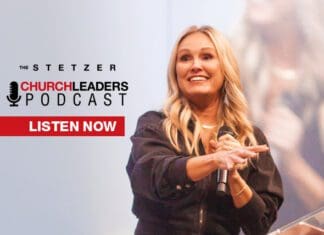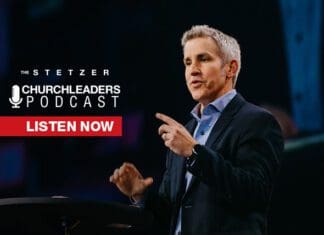‘Count My Blessings’ Artist Seph Schlueter Challenges Christians Not To Be Ashamed of the Gospel
Last month, worship leader and rising CCM artist Seph Schlueter released his long-awaited debut album, “Counting My Blessings.”
Wonder Project Releases Stunning First-Look Images for ‘House of David’ Season 2
The smash hit biblical drama “House of David” will debut its second season on Wonder Project's exclusive Prime Video streaming service on Oct. 5.
Matt MacArthur, Eldest Child of John MacArthur, Now President of Grace to You
According to an update posted on the website of Grace to You, Matt MacArthur—the eldest child of late pastor and Bible teacher John MacArthur—is now the ministry’s president.
Trailer Gives First Look at Nicolas Cage in Horror Film About the Childhood of Jesus
"The Carpenter's Son" is based on the apocryphal Infancy Gospel of Thomas and will be released this fall.
DeVon Franklin and Tyler Perry Bring a Modern-Day Spin on a Biblical Story With Netflix’s ‘Ruth & Boaz’
DeVon Franklin and Tyler Perry have teamed up with Netflix to bring a modern-day interpretation of the Bible’s story about Ruth and Boaz.
American Bible Society Funds AI Assistant, YouTube Shows To Boost Gen Z Bible Use
American Bible Society has issued grants to Christian higher education institutions to encourage innovation in getting young adults interested in Scripture.
‘Apostle’ David E. Taylor Arrested, Charged with Human Trafficking, Money Laundering
Self-styled “Apostle” David Taylor (53) and his associate, Michelle Brannon (56), have been indicted by a federal grand jury for 10 counts related to human trafficking and money laundering.
Forrest Frank Gets Emotional Sharing the Cory Asbury Apology Phone Call He Received; Asbury Writes Another Verse
Forrest Frank thanked Cory Asbury for being honest in his apology for poking fun at what Frank described as “probably the most traumatic moment of my life.”
‘I Prayed’—8th Grader Trusted in God While Helping Classmates During Shooting at Catholic School
During the Minneapolis shooting yesterday, an eighth grader at Annunciation Catholic School said he fell to the floor and prayed and then tried to reassure his frightened classmates.
Trinity Broadcasting Network Accuses Dr. Phil of Scheme To ‘Fleece’ the Network
Dr. Phil McGraw could face sanctions in an ongoing legal dispute with Trinity Broadcasting Network (TBN) following a soured $500 million partnership.
Top Articles
12 NFL Players Who LOVE Jesus (and Football)
Here's our latest list of notable Christian football players. These outspoken NFL players are strong in their faith and are not afraid to share their Christian beliefs.
12 Things Pastors Cannot Do
There are 12 things a church pastor cannot do. Pastors are amazing people and, in faith, they can do a lot...just not these things.
12 Habits That Lead to Divorce, and How to Avoid Them!
No one intends to develop these habits that lead to divorce. In fact, every married couple has exchanged vows which promise “til death do us part,” but for far too many marriages, their dreams of “forever” are crushed by divorce.
Can a Christian Drink Alcohol?
Can a Christian drink alcohol? I have yet to hear from anyone who drinks say how alcohol enhances anything or blesses anyone.
Tim Keller: 3 Questions Fake Christians Can’t Answer
There are several questions that fake Christians won't be able to answer. According to Tim Keller, these are questions that focus on hallmarks of a growing relationship with God.
LATEST ARTICLES
Join our community and be part of the conversation.
To subscribe, simply enter your email address on our website or click the subscribe button below. Don't worry, we respect your privacy and won't spam your inbox. Your information is safe with us.
Get emails and offers from ChurchLeaders.com. Privacy
































